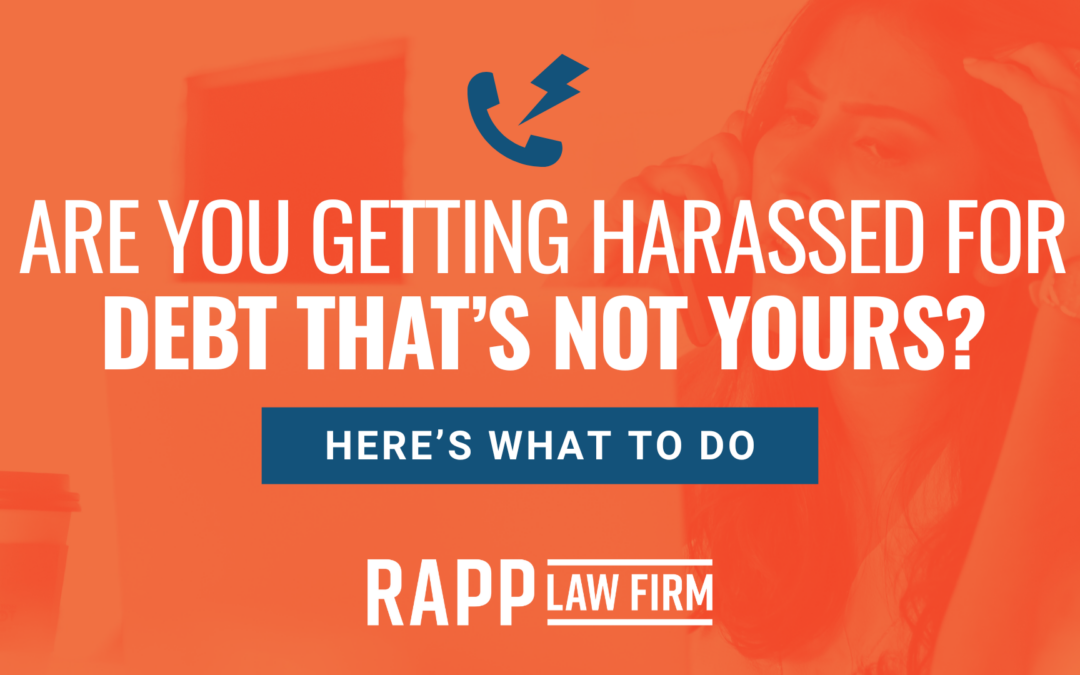Debt can be an overwhelming situation to manage.
However, it’s even worse if you start to get harassed for debt that is not even yours to begin with.
A debt collector’s role is to contact an individual who has a record of debt with the company they have been assigned to collect. They are not looking for whether it truly belongs to you. If your name and information are on it, you will be the one contacted. Unfortunately, this could lead to you getting calls about debt you do not recognize.
Thankfully, there is something you can do about it.
What Is Considered Debt Harassment?
Debt collectors have rules they must follow when contacting you. Debt collectors must follow the rules established from the Fair Debt Collection Practices Act. This act ensures that your privacy and life are protected throughout the process of debt collection.
If a debt collector crosses a line – it may be into harassment. So, it is important to understand what debt collectors can and cannot do when they contact you.
While not a complete list – here are some examples. Debt collectors can not call you before the hours of 8 am or after the hours of 9 pm. They can not lie about your debt. Debt collectors must tell you the truth while providing you with the information necessary to seek out more information on the debt. Debt collectors also can not inform others about your debt, so they can’t call your family or friends and tell them about your debt to embarrass you. Most importantly, debt collectors can not pretend to be attorneys or threaten you with arrest or violence.
Signs the Debt May Not Be Yours
If you start getting calls from debt collectors and you don’t recognize what they are referring to, it is possible that the debt is not yours to begin with. You could be the victim of falsely reported credit information or possible identity theft. Thankfully, there are some tell-tale signs.
The most significant sign that the debt is not yours is if you do not recognize the creditor or the account details. Additionally, if you look into the debt and start to see incorrect information, such as a wrong address, misspelled name, or possibly missing information, it could be a case of incorrect reporting.
Choosing to check your credit report after receiving calls from debt collectors and finding accounts or loans are there that you did not open or know about, is a likely sign that the debt is not yours. It could also be a sign of identity theft.
Thankfully, there are steps you can take to remedy the situation.
First, File a Dispute With the Debt Collector
If you learn that the debt that is being reported is not yours, you have 30 days from the initial call from the debt collector to file a dispute letter with the debt collection company. This must be done in writing. The letter should include the reason that the debt is not applicable to yourself, such as the debt is old and past the statute of limitations, it has incorrect information, the debt collector can not provide proper documentation, you’ve been the victim of identity fraud, or the debt collector can not produce proper debt validation. You’ll also want to include any correct information to help validate the dispute.
Second, File a Dispute With the Credit Reporting Agencies
From there, you will need to dispute the incorrect information, the wrongly reported debt, on your credit reports to the three main credit bureaus. You will have to do this individually, which can be done online or by mail.
Experian:
File Your Dispute Online– Experian
Mail-In– Experian
P.O. Box 4500
Allen, TX 75013
Equifax:
File Your Dispute Online– Equifax
Mail-In– Equifax Information Services LLC
P.O. Box 740256
Atlanta, GA 30348
TransUnion:
File Your Dispute Online– TransUnion
Mail-In– TransUnion LLC Consumer Dispute Center
P.O. Box 2000
Chester, PA 19016
Third, Request for the Debt Collectors to Stop Contacting You
At this point, you have the ability to request that the debt collectors stop contacting you since the debt is not yours to pay. You can do this by filing a cease and desist letter, insisting that the debt collection company stop contacting you about the specified debt. To go the extra mile, you can send this letter through certified mail to ensure that you have proof that they received the letter. You can choose to specify that any further communication goes through your attorney.
Fourth, Seek Additional Legal Help
Throughout this entire process, it is essential that you keep documentation on every correspondence between you and the debt collectors and credit agencies. This can be important if the debt collectors still decide to contact you. If you take these steps and the incorrect debt is not taken seriously or debt collectors continue contacting you, you can seek legal counsel. All the information you have collected will help them represent you and ensure your case is rightfully settled.
An incorrectly documented debt does not need to put your life on standby. If you have further questions or have found yourself in this situation, contact the team at Rapp Law Firm.

